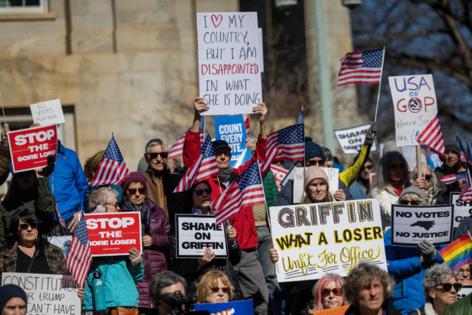Federal judge orders North Carolina to certify Riggs as winner in Supreme Court election
Published in News & Features
RALEIGH, N.C. — In a ruling that could put an end to nearly six months of legal battles over North Carolina’s contested Supreme Court election, a federal judge on Monday ruled against the Republican candidate’s effort to overturn his narrow loss.
Chief U.S. District Judge Richard E. Myers, an appointee of President Donald Trump, ruled that Jefferson Griffin, a judge on the state Court of Appeals, cannot “change the rules of the game after it had been played.”
Myers ordered the state not to throw out any votes and to certify the results of the election as they were at the close of the canvas period, with Democratic incumbent Allison Riggs winning by 734 votes.
However, Myers put his own order on hold for seven days to give Griffin a chance to appeal.
Riggs’ win has been blocked ever since Griffin and the North Carolina Republican Party embarked on an unprecedented campaign to challenge his 734-vote loss by contesting over 65,000 ballots.
Although the state Supreme Court threw out Griffin’s largest challenge, potentially thousands of military and overseas ballots would have been in jeopardy under a 30-day ballot review process, known as a “cure period” devised by the high court. Several hundred other voters challenged over their residency status would’ve had their votes canceled without the chance to cure them.
Myers’ decision, if it stands, means that the cure period will not begin and no votes will be discarded.
Griffin and the NC GOP are likely to appeal Myers’ ruling to the 4th Circuit U.S. Court of Appeals, though that court has already ruled against their efforts once.
How did we get here?
In an chaotic months-long campaign, Griffin has attempted to discard tens of thousands of votes cast in the race in the hopes that it could flip the result in his favor.
The litigation has ping-ponged between state and federal courts and drawn national attention from critics who warn that his effort, if successful, could form the playbook for challenging legitimate election results across the country.
While Griffin initially challenged over 65,000 ballots, the number of votes in contention was significantly reduced by the Republican-dominated North Carolina Supreme Court last month when it rejected his largest challenge, which dealt with voters who didn’t have certain identifying numbers in the state’s registration database.
The court ruled that this omission, which affected over 60,000 of the challenged voters, was likely not the voters’ fault and therefore could not be used to cancel their ballots.
However, in a 4-2 decision, the Supreme Court ordered that potentially thousands of military and overseas voters would have to show their IDs during a 30-day “cure period” or risk having their votes thrown out.
A smaller group of voters who were challenged for their residency status would have their ballots discarded without a chance to cure them. Reporting from Anderson Alerts and Popular Information found reason to believe that dozens of these voters, who Griffin argues have never resided in the state, are actually longtime North Carolina residents.
Riggs immediately brought the matter to Myers, who said he would review the case before a winner was certified but would not stop the cure period from beginning. Riggs appealed to the 4th Circuit, which agreed to issue a stay halting the cure period, at least until Myers could rule on the merits of the case.
While briefing commenced in the federal court, Griffin began arguing in state court about the scope of the court-ordered cure period, contending that election officials’ plans to implement it were not expansive enough.
The State Board of Elections’ plan for carrying out the cure period would have affected 1,675 voters at most. Griffin, however, argued that more ballots — potentially over 5,000 — should be brought into question, and that the challenged voters should have fewer opportunities to cure their ballots.
_____
©2025 The Charlotte Observer. Visit charlotteobserver.com. Distributed by Tribune Content Agency, LLC.







Comments